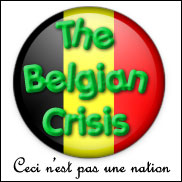The Proliferation of McNations
From the desk of The Brussels Journal on Tue, 2007-10-09 08:20

A quote from Jonah Goldberg in The Los Angeles Times, 9 October 2007
[H]ere's the hilarious irony of all this: The European Union is in effect subsidizing nationalism in Belgium and across the Continent. As the EU assumes more of the responsibilities of states – regulations, the economy, currency, possibly even defense – the cost of independence becomes lower. […] The catch-22 is delightful. By scaling back the job description of a nation-state to a few ceremonial duties, ethnic minorities see fewer risks and a lot more rewards in breaking away. Countries such as Slovakia get to trade on their votes in the EU and the U.N. They get their own anthems and sports teams and to teach their own language and culture. It's like a McDonald's franchise. […] The question is whether the nationalist hunger of such McNations can be satisfied by just the symbolism of autonomy.
This points to why I take so much pleasure in the troubles in Brussels. The EU always made the most sense to Belgians, who have a very weak national identity. The myth was that everyone felt the same way. Indeed, the EU project has always been predicated on self-serving myths. Another is the idea that with greater “understanding” comes greater peace and comity. The Walloons and the Flemings understand each other; they just don’t like each other very much.
But what I really like about the Belgian crisis is that it puts a dent in the myth that Europe represents some enlightened new model exportable to the rest of the globe. After World War II and the Holocaust, a generation of diplomats and intellectuals predicted that nationality, religion and culture would matter less in the New Europe. But wishing didn’t make it so. Obviously, nobody wants the bloody nationalism of early 20th century Europe. But it’s nonetheless gratifying that the even on the EU’s Brussels campus, life resists the blueprints of the bureaucrats.
.
| A Throne in Brussels: Britain, the Saxe-Coburgs and the Belgianisation of Europe Author: Paul Belien ASIN: 1845400658 |

In Reply to Jonah Goldberg
Submitted by Kapitein Andre on Wed, 2007-10-10 04:32.
Goldberg: [H]ere's the hilarious irony of all this: The European Union is in effect subsidizing nationalism in Belgium and across the Continent. As the EU assumes more of the responsibilities of states – regulations, the economy, currency, possibly even defense – the cost of independence becomes lower. […] The catch-22 is delightful. By scaling back the job description of a nation-state to a few ceremonial duties, ethnic minorities see fewer risks and a lot more rewards in breaking away. Countries such as Slovakia get to trade on their votes in the EU and the U.N. They get their own anthems and sports teams and to teach their own language and culture. It's like a McDonald's franchise. […] The question is whether the nationalist hunger of such McNations can be satisfied by just the symbolism of autonomy.
Interesting points. However, I am convinced that this process will backfire for the European Union as these nations will seek full state sovereignty even if they want to be part of the European security and economic bloc.
Goldberg: This points to why I take so much pleasure in the troubles in Brussels. The EU always made the most sense to Belgians, who have a very weak national identity. The myth was that everyone felt the same way. Indeed, the EU project has always been predicated on self-serving myths. Another is the idea that with greater “understanding” comes greater peace and comity. The Walloons and the Flemings understand each other; they just don’t like each other very much.
Agreed.
Goldberg: But what I really like about the Belgian crisis is that it puts a dent in the myth that Europe represents some enlightened new model exportable to the rest of the globe. After World War II and the Holocaust, a generation of diplomats and intellectuals predicted that nationality, religion and culture would matter less in the New Europe. But wishing didn’t make it so. Obviously, nobody wants the bloody nationalism of early 20th century Europe. But it’s nonetheless gratifying that the even on the EU’s Brussels campus, life resists the blueprints of the bureaucrats.
Well nationalism caused the end of the Soviet bloc.